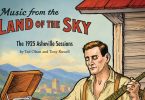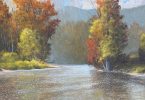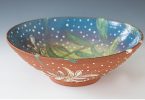
Folk School students, circa 1933. Photo by Doris Ulmann, courtesy of the John C. Campbell Folk School
By Lauren Stepp
One hundred years ago, a group of students gathered in Brasstown. They didn’t come for grades or diplomas or prestige. They came to carve wood, grow food, sing songs and, perhaps most importantly, preserve rural life. At the center of this quiet revolution was Olive Dame Campbell, founder of the John C. Campbell Folk School.
A New Englander by birth and an Appalachian visionary by calling, Olive met her husband, John C. Campbell, in 1903. The two spent years traveling the mountains of KY, TN, GA and western NC, documenting the living conditions of working folk for the Russell Sage Foundation.

Olive Dame Campbell, circa 1933. Photo by Doris Ulmann, courtesy of the John C. Campbell Folk School
During this time, Olive and John learned about an innovative model of education in Denmark called the folkehøjskole, or folk school. “… [T]he Danish people were successfully educating their younger generations in a way that inspired them to continue rural, agricultural life—something which John and Olive saw a lack of in the United States,” says Susanna Pyatt, collections and archives manager at the Folk School.
The couple planned to travel to Denmark to learn more about the pedagogical model firsthand, but John died in 1919 before they could make the trip. However, Olive carried their vision forward, founding the Folk School in 1925. Working alongside educator Marguerite Butler, she designed a coeducational, residential program with winter terms for young adults and summer short courses for teachers, missionaries and community leaders.
According to Pyatt, the curriculum centered around agriculture, craft, domestic skills and academic subjects.
“This integration of work and joy was a quite different focus than conventional education’s emphasis on sitting in classrooms to earn grades by learning from books and memorization,” says Pyatt. “Olive’s educational philosophy was instead focused on developing students into well-rounded adults who enjoyed a life where work, community and play—such as dancing and singing—were integrated.”
Craft, in particular, became central to the school’s mission and a way in which rural people could stay on the land. “The development of cottage industries, such as weaving and woodcarving, provided much-needed cash income for people in the Southern Appalachians,” says Pyatt. This mix of forward-thinking ideas and practical solutions helped the Folk School thrive.
“Olive’s idealism really spoke to the hearts of young people, who knew the world was changing and wanted new ways to find their place in it,” says Bethany Chaney, executive director of the Folk School. “Her pragmatism spoke to older folks who, through their own circumstances, understood the challenges of achieving and maintaining a self-sufficient and joyful life.”
A century later, the Folk School continues to uphold Olive’s hands-on educational philosophy. “Learning by doing requires initiative, experimentation, freedom to fail and permission to soar,” says Chaney. “The process is more important than the product if learning is to be relevant to our day-to-day lives.”
To learn more, visit FolkSchool.org.






